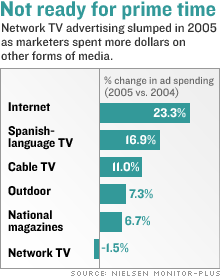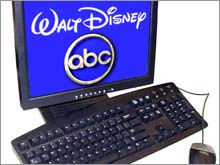|
5 questions about the future of the boob tube
Heading into next week's TV upfront presentations, here are five key issues that will be on the minds of network execs and advertisers.
NEW YORK (CNNMoney.com) - $9.1 billion. That's approximately how much money the major broadcast networks took in from advertisers during last year's "upfront," the period when marketers make ad decisions for the upcoming fall TV season. This year's upfront kicks off next week, when the major networks unveil their prime-time lineups for 2006-2007 in New York City, and it stands to be one of the more interesting upfronts in years. Two new networks will debut and advertisers and the networks are trying to figure out how much commercials are worth in an age of digital video recorders (DVRs) and streaming video downloads. Many industry watchers doubt that the big media companies can rake in as much ad revenue as they did last year: several predict a decline in ad revenue to about $8.7 billion to $8.8 billion. With that in mind, here are five key issues that people will be talking about next week. Who will be the biggest winner: ABC, CBS or Fox?
It's a horse race heading into the final weeks of this season. CBS (Research) is currently leading the overall ratings battle, according to Nielsen Media Research. But it is third in the 18-49 demographic that causes advertisers to drool uncontrollably. Walt Disney (Research) CEO Bob Iger touted the strong position for his company's ABC network during Disney's earnings conference call on Tuesday. It is the only network to experience an increase in viewers both overall and for the 18-49 group. But during Wednesday afternoon's News Corp (Research). earnings call, chief operating officer Peter Chernin predicted that News Corp.-owned Fox, currently ranking first with 18-49 year olds, would win this title for the second season in a row. So who really will be the big winner? Bill Carroll, vice president and director of programming for Katz Television Group, a media consulting firm, said CBS has an advantage because of its stability: it has few holes in its schedule to fill. Carroll also said Fox is in better position than last year because it proved that there was more to its schedule than "American Idol" since "House," "Prison Break" and "Bones" also became solid hits. But he thinks things might be tougher for ABC than Disney would like to admit since the network is losing the stalwart "Monday Night Football" this fall. (ESPN, also owned by Disney, will air MNF instead.) Can NBC make a comeback?
The Peacock Network doesn't have much to be proud of lately. The Winter Olympics couldn't even help save NBC, owned by General Electric. (Research) NBC is on pace to finish in fourth place with 18-49 year olds. What's more, NBC's share of this demographic is down 8 percent from a year ago. "Everyone is anxious to see if NBC can stop its bleeding. We need to see something big out of NBC," said Gary Carr, a senior vice president and director of national broadcast with TargetCast tcm, a media buying firm. Still, there may be reason to believe the worst may be over for the network. Next season, NBC will air National Football League games on Sunday night. The hope is that in addition to big ratings on Sunday, NBC will be able to drum up interest for other shows throughout the week with promotions during the NFL telecasts. And there has been some favorable buzz for three new shows the network has already said will be on its fall schedule: "The Black Donnellys," "Kidnapped," and "Studio 60 on the Sunset Strip." What impact will the new networks have?
In January, CBS and Time Warner (Research) announced they were merging their UPN and WB networks to create the CW. This new network is expected to take the best-performing shows from UPN and the WB to create one with a particularly strong focus on teens and young adults. (Time Warner also owns CNNMoney.com.) When the CW merger was announced, conventional wisdom was that by going from six prime-time networks to five, competition for commercial spots would increase, driving up ad rates across the board. But that may no longer be the case. News Corp., which owned several local stations that carry the UPN which would have been left out in the cold as a result of the CW deal, responded by launching a mini-network called MyNetworkTV that is aiming squarely at the core CW viewer. This network, which currently has distribution agreements to be carried in about 63 percent of the country, will feature young adult-oriented dramas that air five nights a week for 13-week stretches. This so-called telenovela format is highly popular on Spanish language TV. Still, some think that neither new network, despite their focus on the lucrative younger market, will make a significant dent against the big four networks. "Everyone is curious about what the CW and MyNetworkTV will do but neither of those networks will capture really big numbers and each network will be going after niche audiences," said Shari Anne Brill, vice president and director of programming with Carat USA, another media buying firm. What role will technology have in determining ad rates?
Many advertisers have griped about how prime time commercials are not as effective as they used to be since a growing number of boob tube watchers use DVRs to zap past commercials. This could lead to ad rate declines in the coming season, some buyers say. But the four biggest networks are looking for new ways to generate money. ABC, CBS, NBC and Fox now all have some of their shows available for purchase on Apple's (Research) iTunes store. ABC and CBS have also begun to offer some of its shows for free online with advertising that cannot be skipped. And News Corp. has launched a network called Mobizzo that offers Fox content on cell phones. It also owns the popular social networking site MySpace and recently created a video section on that site. News Corp.'s Chernin said Wednesday that Fox has already presented advertisers with a plan called Generation Fox that highlights advertising opportunities for network TV, cable, the Internet and for mobile phones. Expect the other networks to also try and sell ads across various platforms during the upfront. But at the end of the day, Carr thinks that the networks will only be successful in boosting ad sales if they actually create shows that people want to watch...regardless of how, when, or where they watch them. "Alternative forms of watching programs mean nothing if there are no good programs to watch," said Carr. Will cable eat into network ad revenue?
The broadcast networks aren't the only ones that will be presenting new lineups next week. Many cable networks will as well. And despite all the talk about how viewers are fleeing the major networks in favor of their computers, iPods and game consoles, there clearly has been a migration to cable as well. "Cable obviously has an impact on ratings," said Katz' Carroll. Networks such as USA, FX and TNT have all had success with original programming during the past few years and analysts expect that to continue. To that end, cable TV ad spending rose 11 percent in 2005 compared to a 1.5 percent decline for network TV. But the one positive from the increased popularity of cable, however, is that for at least some media companies, it helps offset the declines on the network side. GE's NBC Universal unit also owns USA. Time Warner owns TNT and News Corp. owns FX. ----------------- For more about how ABC is boosting Disney's profits, click here. Is there an online video bubble? Click here.
The reporter of this story owns shares of Time Warner through his company's 401(k) plan. |
|





